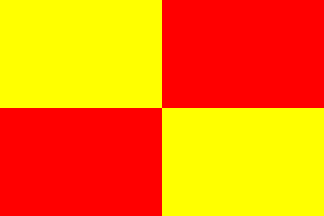
FOTW beschäftigt sich mit der Wissenschaft der Vexillologie (Flaggenkunde).
Alle auf dieser Website dargebotenen Abbildungen dienen ausschließlich der Informationsvermittlung im Sinne der Flaggenkunde.
Wir distanziert uns ausdrücklich von allen hierauf dargestellten Symbolen verfassungsfeindlicher Organisationen.
Last modified: 2014-06-29 by klaus-michael schneider
Keywords: nazaré | coat of arms: fish | tower (grey) | dolphins: 2 | dolphin: heraldic | dolphin (yellow) | wave (green) | waves: 3 |
Links: FOTW homepage |
search |
disclaimer and copyright |
write us |
mirrors

It is a fairily typical portuguese municipal flag, with the
coat of arms centered on a yellow and
red quartered (town rank) background.
Flag and arms adopted and published in the official journal
Diário do Governo : I
Série in 1957.06.03.
António Martins, 25 Jan 2007
.gif)
The arms are Vert on a mound proper charged with a wavy fess Vert on a wavy
fess Argent a tower Argent masone Sable and litten and open Gules with dome
topped by a cross and over all two dolphins Or urinant respectant. Mural crown
argent with four visible towers (town rank) and
white scroll reading in black upper case letters scroll reading in black upper
case letters "NAZARÉ".
António Martins, 25 Jan 2007

Plain (monocolored) portuguese subnational flags are
not allowed to have armless
variations: plain flags always carry the coat of arms.
Jorge Candeias, 18 Jul 1999
A curious photo used in
a
1970’ies postcard shows the municipal and
national flags hoisted on two poles seen from their
intersection line, looking like a single red, yellow and green flag.
António Martins, 25 Jan 2007
Nazaré municipality had 15 060 inhabitants in 2001, and it consists of
3 communes, covering 80,49 km². It is
part of Leiria District, traditional province
Estremadura, 1999 ref. adm. region Estremadura e
Ribatejo, current C.C.R. / NUTS II Centro, pre-2002 C.C.R. / NUTS II Lisboa e
Vale do Tejo, and NUTS III Oeste.
António Martins, 25 Jan 2007
"Nazaré" is the traditional Portuguese form for Nazareth
(נָצְרַת), in the
“Holy Land”.
António Martins, 2010
Before 1912, Nazaré was named Pederneira (=Flint). I suppose the name
change occurred as a reaction against secular Church-State seppartion policies
adopted by the republican Government, based on the local marian apparition
veneration of Our Lady of Nazareth (Nossa Senhora da Nazaré).
António Martins, 25 Jan 2007
Anything below this line was not added by the editor of this page.
Hosted by: Fanshop-Online.de und Handy-Shop.de
Tipp: Apple iPhone 12 im Shop